Smart Contract Audit Cost Explained: Full Guide for 2025 Projects
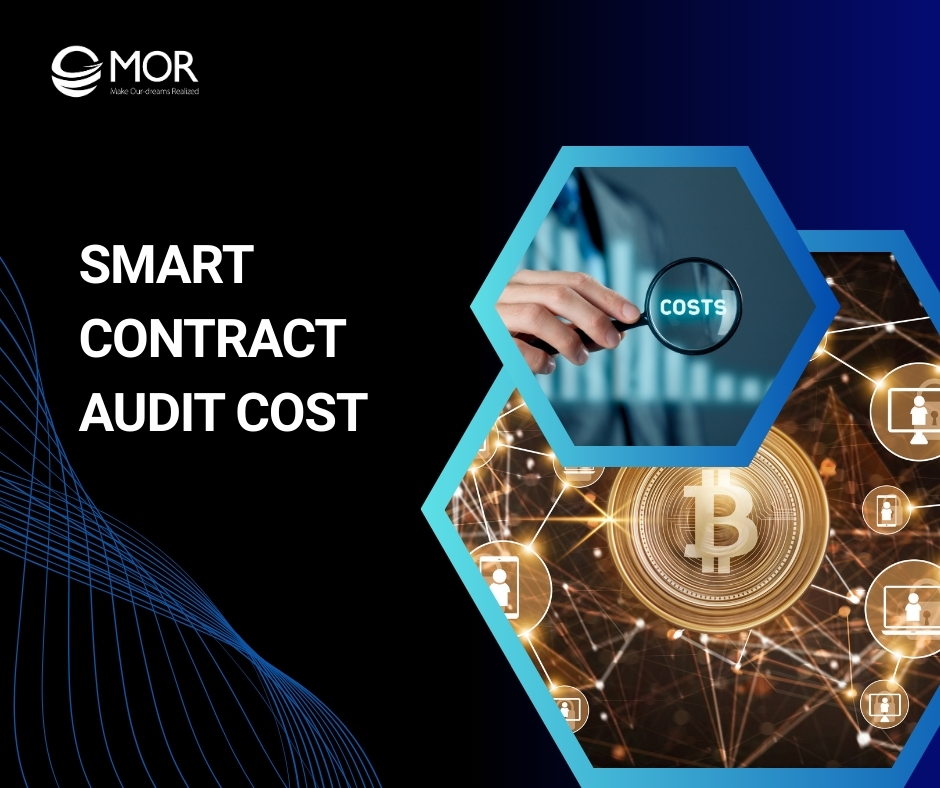
The smart contract audit cost can be confusing, especially when figures vary from $10,000 to over $150,000. Many teams still wonder how much does a smart contract audit cost and why the price matters so much for project security. This MOR Software’s guide will break down the numbers, reveal the factors behind them, and show you how to plan effectively for your 2025 projects.
What Is A Smart Contract Audit?
A smart contract audit is a detailed review of blockchain code that checks for weaknesses and ensures functions behave as intended. The main purpose is to catch flaws early, so they don’t lead to hacks, bugs, or lost funds when deployed live. In short, it’s a safeguard against expensive mistakes.
History shows how damaging overlooked errors can be. In 2017, the Parity Wallet bug erased $30 million because a developer missed a single edge case in the contract design.
Think of it as a health check for code. Just as doctors examine patients to prevent illness from getting worse, auditors go through contracts line by line to spot vulnerabilities or faulty logic before attackers can exploit them.
The process usually combines expert manual inspection with specialized tools. Once the smart contract audit cost process is finished, teams receive a full report that explains the findings, details any risks, and recommends fixes to strengthen the contract before launch.
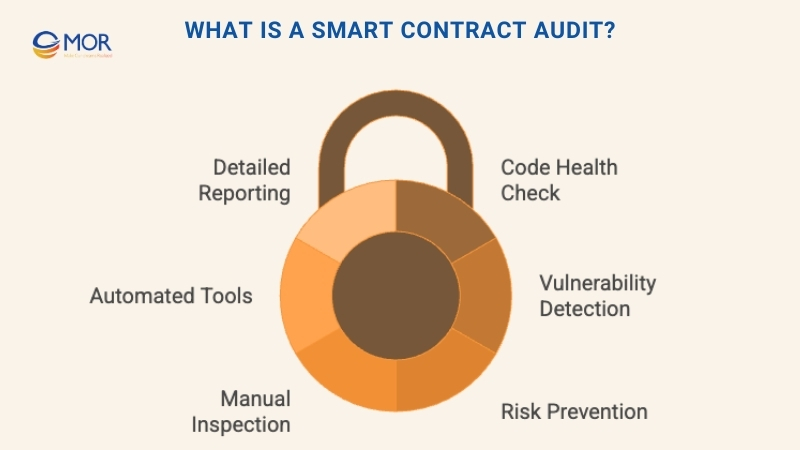
Key Factors That Affect Smart Contract Audit Cost
The smart contract audit cost depends on many elements, from technical complexity to the scope of the review and market conditions. Each project has different requirements, so no two audits are exactly the same. The price reflects how much time, effort, and expertise is needed to complete the process securely.
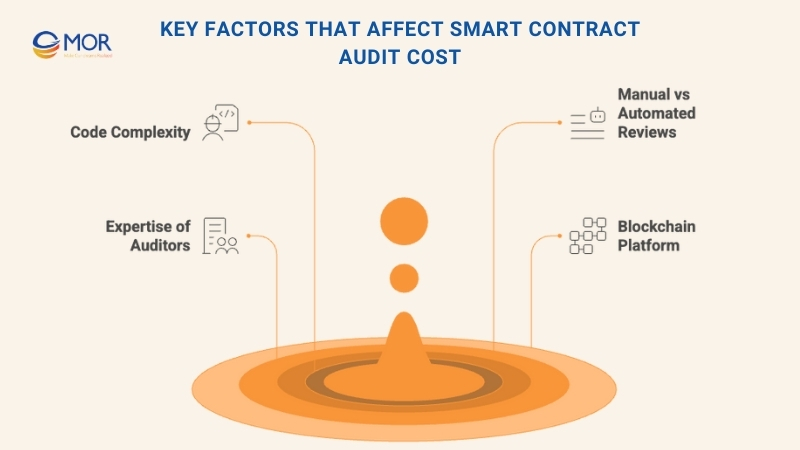
Code Complexity And Size
Not every smart contract carries the same level of difficulty. A simple ERC-20 token with basic functions like transfers or minting may only take a few hundred lines of code. On the other hand, a large DeFi system could run into tens of thousands of lines, featuring governance layers, liquidity pools, and integrations with third-party platforms.
Typical cost ranges look like this:
- Basic Contracts (ERC-20): $10,000–$20,000. Straightforward and fast to check.
- Medium Projects (dApps or NFT Marketplaces): $20,000–$50,000. Require deeper analysis of connected modules.
- Advanced Protocols (Cross-Chain Systems): $75,000–$150,000+. These demand rigorous testing across multiple environments.
Every new function adds more testing steps, which increases both the time and expense. That’s why complexity is the single biggest driver of the cost of smart contract audit, making it essential for teams to budget properly before launch.
Manual Vs Automated Reviews
Smart contract auditing usually blends automated scanning with human expertise, but the ratio depends on how complex the project is.
- Automated Tools: Programs such as Slither, Echidna, or MythX run quick checks for well-known issues like reentrancy or overflow. They’re fast, affordable, and ideal for spotting surface-level flaws. Still, they often miss deeper problems tied to project-specific logic.
- Manual Code Reviews: Skilled auditors inspect each line of code with careful attention. This process uncovers hidden bugs that automated scans can’t detect, like logic errors that appear only in rare conditions.
Because manual work takes more effort and skill, it drives up the smart contract audit cost. Yet, this level of precision is crucial in any smart contracts audit, since even a single unchecked flaw can create major financial risks.
Expertise Of Audit Providers
Leading firms like ConsenSys Diligence or Trail of Bits typically charge higher rates for their services. The reason is simple: these teams employ auditors with years of blockchain experience and proven track records. They know Solidity inside out, and more importantly, they understand the tactics attackers use to break into contracts. That expertise directly shapes the smart contract audit cost.
Smaller providers or freelancers may present lower prices, but they often lack the depth, resources, or processes needed for a full review. When millions in assets are locked inside decentralized applications, trusting an inexperienced auditor is a serious risk. According to recent discussions about the trail of bits smart contract audit cost, the premium often reflects the unmatched quality of analysis and the assurance that critical vulnerabilities will not be missed.
Blockchain Platform Considerations
The blockchain environment where a project is deployed has a direct effect on the smart contract audit cost. Ethereum audits are often priced higher because Solidity contracts introduce more complexity and need deeper review.
- Algorand: Generally more affordable, since its simplified contract design reduces the risk of common exploits.
- Binance Smart Chain (BSC): Pricing is usually close to Ethereum, given its nearly identical architecture and tooling.
Ethereum still dominates as the most frequently audited network, especially for dApps, DeFi protocols, and NFTs. Other blockchains may offer lower costs, but they sometimes lack a large pool of expert reviewers. For critical builds, especially those needing a bridge smart contract security audit, teams must factor in both availability of skilled auditors and the potential risks tied to the chosen platform.
How Much Does A Smart Contract Audit Cost?
The smart contract audit cost can vary widely depending on project size, code complexity, and the reputation of the firm you hire. While the price may appear high at first, skipping this step exposes projects to security failures, especially in DeFi and NFT ecosystems where large sums are at risk. Teams should remember that an audit is an investment in protecting both users and long-term credibility.
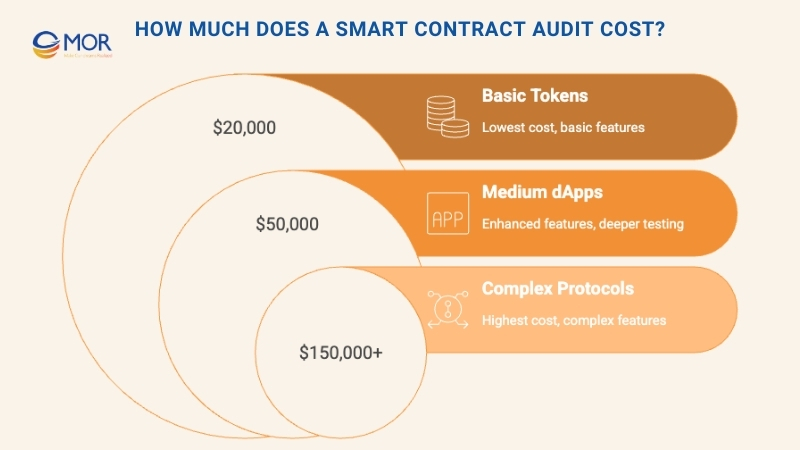
Price Ranges By Project Category
Drawing from data released by well-known auditors like ConsenSys Diligence and Trail of Bits, here’s a typical breakdown of audit pricing:
- Basic ERC-20 Tokens: $10,000–$20,000. These contracts contain minimal logic, so they are faster and less expensive to review.
- Medium-Level dApps: $20,000–$50,000. Covers lending platforms, staking modules, or governance systems. These require closer inspection and extensive test coverage.
- Complex Protocols Or Ecosystems: $75,000–$150,000+. Large projects with detailed tokenomics, interoperability, or cross-chain designs fall into this tier. Because these audits require manual reviews and thorough testing, the cost is considerably higher.
Why Costs Vary
Several elements shape the final smart contract audit cost, making it important for teams to understand what drives pricing.
- Code Complexity: Larger and more intricate contracts require more effort and time to review thoroughly.
- Audit Approach: Manual analysis takes longer and is more expensive than automated scans, but it catches subtle logic errors that tools like Slither may miss.
- Auditor Expertise: Established firms with a proven history in blockchain auditing often charge premium rates. Their experience, however, greatly reduces the chance of missed vulnerabilities.
- Platform Choice: Ethereum audits usually cost more because Solidity is complex, whereas blockchains with simpler frameworks, such as Algorand, often come with lower pricing.
The Risks Of Skipping An Audit
The price of an audit may seem steep at first, but the real danger lies in avoiding it. History shows that skipping this step can lead to catastrophic losses.
- DAO Hack (2016): Over $55 million vanished in a reentrancy attack, forcing Ethereum to undergo a hard fork.
- Lendf.me (2020): Attackers exploited another reentrancy flaw, draining $25 million from a DeFi platform.
- Parity Wallet Bug (2017): A single overlooked vulnerability led to losses of around $30 million.
Each of these incidents highlights how an audit could have prevented disaster. Projects that ignore the smart contract audit cost risk losing far more in hacks, lawsuits, and reputational damage. Especially in high-value ecosystems, the defi smart contract audit cost is trivial compared to the billions at stake. Treat audits as protection, not just another line item in the budget.
How Long Does A Smart Contract Audit Take?
The time needed for an audit is closely tied to project complexity, code volume, and the chosen review methods. Unlike many tech processes where speed is a priority, here precision comes first. A rushed review could leave exploitable gaps behind, and no blockchain project can afford that risk. The smart contract audit cost also rises when timelines stretch, since more resources are required.
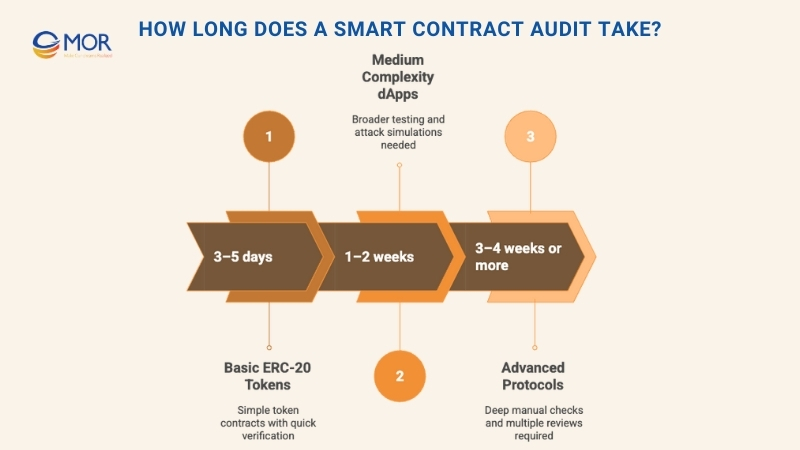
Common Timelines
Here’s a typical breakdown of how long different types of audits usually take:
- Basic ERC-20 Tokens: 3–5 days. Standardized design and simple logic make these contracts quick to verify.
- Medium Complexity dApps: 1–2 weeks. DeFi lending apps or governance modules need broader tests, including simulations of possible attack paths.
- Advanced Protocols: 3–4 weeks or more. Large systems with tokenomics, cross-chain modules, and third-party integrations require deep manual checks and several review rounds. For complex builds, a solidity audit of this scale ensures that hidden flaws don’t slip through.
Factors That Influence Duration
Several elements can speed up or slow down an audit, directly affecting timelines and even the overall smart contract audit cost. Understanding these factors helps teams plan more accurately and avoid delays.
- Code Quality And Documentation: Clean, organized, and well-documented code allows auditors to work more efficiently. Poorly written contracts or missing documentation slow things down, since auditors must spend extra time interpreting intent before reviewing security.
- Interim Or Full Audits: Some projects schedule interim reviews during development, while others wait until the final version is ready. Interim audits can catch problems early but add to the overall timeline, and they also affect the final smart contract audit cost.
- Manual Vs. Automated Reviews: Tools like MythX or Slither provide fast scans for common flaws, shortening the first review cycle. Manual checks, however, dig deeper and detect issues that automated methods miss, such as complex logic flaws.
- Team Communication: Delays in responding to auditor questions or applying fixes can stretch schedules unnecessarily. Quick collaboration helps auditors complete their work without setbacks, which is something every project should consider when asking about the average cost smart contract audit 2025.
Why Proper Timing Is Important
Cutting corners on an audit almost guarantees problems later. A careful process gives auditors enough time to detect weaknesses, recommend fixes, and confirm those fixes work as intended. This thoroughness not only protects code but also builds trust with users and investors.
At the same time, be cautious of any provider that promises unusually fast results for complex systems. Quality reviews take time, and the smart contract audit cost is wasted if the work is rushed. By understanding timelines and how they’re shaped, teams can plan their roadmap effectively and align with the best smart contract audit company for their needs.
Tips To Manage Smart Contract Audit Cost Effectively
An audit may look like a heavy upfront investment, but it doesn’t have to drain your budget. With careful planning, you can keep the smart contract audit cost under control while still achieving strong security standards. The key is preparing well and approaching the process strategically.
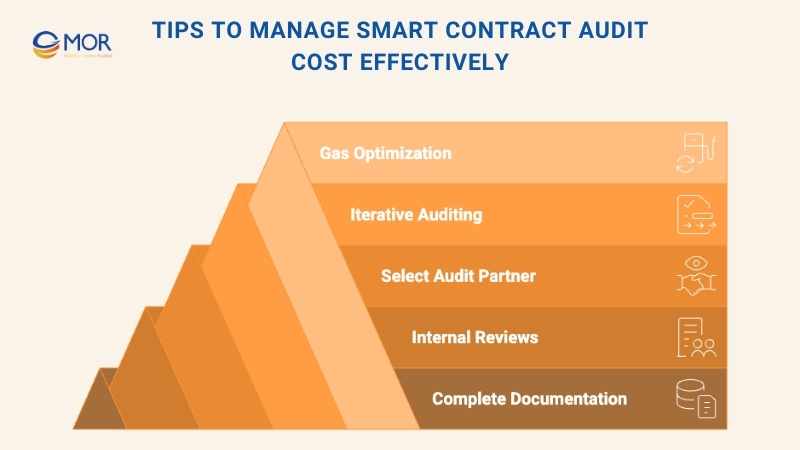
Provide Complete Documentation
Before the first line of code is reviewed, auditors need context. Supplying clear explanations of your contract’s purpose and how each function works gives them the foundation they need. Strong documentation should also include descriptions of custom logic and a thorough test suite to outline expected behavior.
When auditors spend less time untangling messy or incomplete notes, they can focus on security checks instead. This efficiency shortens project timelines and directly lowers the trail of bits smart contract audit cost, or the fees charged by any other provider. A little preparation upfront goes a long way toward making audits faster, smoother, and more affordable.
Run Internal Pre-Audit Reviews
Carrying out an internal review before hiring auditors helps cut down on preventable issues and saves money. By fixing basic errors early, you reduce the number of problems external reviewers need to flag, which directly lowers the smart contract audit cost.
- Teams can quickly spot simple mistakes such as syntax errors or misplaced logic.
- Developers also get the chance to polish the contract flow, which improves efficiency during the audit phase.
This extra step shows that your team is prepared and serious about quality. It also creates a stronger foundation for external experts to perform a precise solidity audit without being distracted by basic flaws.
Select The Right Audit Partner
Not every provider delivers the same quality. The partner you choose will directly influence both the outcome and the smart contract audit cost. When evaluating firms, prioritize those that:
- Have experience with your blockchain of choice, whether Ethereum, Algorand, or Binance Smart Chain.
- Provide a transparent process that combines automated scans with thorough manual checks.
- Can demonstrate proven results and credible references from past clients.
The objective isn’t simply to find the cheapest quote, but to choose a smart contract audit company that delivers lasting value and security for your project. In fact, asking early about the audit cost with different providers will help you balance quality with budget.
Use Iterative Auditing
Instead of saving all reviews until the end, break the work into stages.
- Schedule an interim audit after the first critical modules are built.
- Run a final check before deployment to confirm every update is secure.
This phased method distributes expenses over time, reduces unexpected findings at launch, and makes the audit process more manageable for both developers and auditors.
Plan For Gas Optimization
Gas expenses often influence how costly it is to deploy a contract, and they also affect the overall smart contract audit cost. Skilled auditors may suggest improvements to reduce gas consumption, but making these adjustments earlier in development saves both time and money.
Using resources like Solidity Gas Reporter, developers can pinpoint inefficient code structures well before the review stage. By addressing gas-heavy functions ahead of time, projects not only lower deployment costs but also simplify the auditing process. In many DeFi ecosystems, where the defi smart contract audit cost is already substantial, gas optimization becomes a practical way to control budgets without sacrificing security.
MOR Software: Your Trusted Partner
When it comes to managing smart contract audit cost and execution, having an experienced technology partner is important. MOR Software brings together certified engineers, global delivery centers, and proven expertise in blockchain, AI, and enterprise software.
We operate under ISO 9001:2015 and ISO 27001:2013 standards, ensuring both quality and security in every engagement. Our teams apply Agile methods, transparent communication, and rigorous testing to support projects ranging from token contracts to complex blockchain ecosystems.
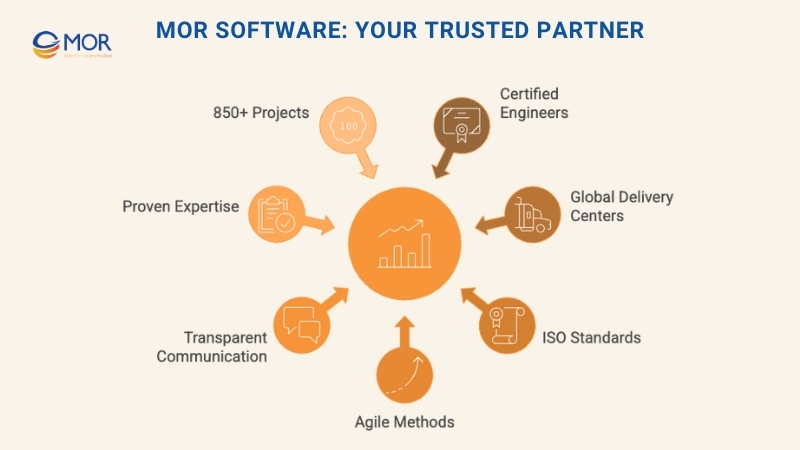
With more than 850 successful projects delivered for international clients, we understand how to balance budget, speed, and precision. Whether you need audit preparation, code review, or ongoing blockchain development support, MOR Software is ready to help.
Contact us to secure your next project with confidence.
Conclusion
Understanding the smart contract audit cost is essential for any blockchain project in 2025. From code complexity to audit timelines, every factor shapes the final price and the level of protection you gain. Skipping or rushing an audit can lead to far greater losses than the upfront expense. With the right preparation and support from experts like MOR Software, you can safeguard your code, manage costs wisely, and launch your project with confidence. Contact us today to discuss your audit needs and secure your project’s future.
MOR SOFTWARE
Frequently Asked Questions (FAQs)
How long does a smart contract audit take?
Standard tokens or NFTs might take just a few days. Big dApps, DAOs, or protocols could take weeks, especially if fixes and re-audits are needed.
How much does a smart contract audit cost?
The smart contract audit cost varies based on project scope and complexity. A basic ERC-20 token may range between $10,000 and $20,000. Mid-level projects like dApps or DeFi platforms typically fall between $20,000 and $50,000, while large ecosystems with custom logic can exceed $75,000. Although the upfront cost may seem high, an audit prevents far greater losses from vulnerabilities.
What is included in a smart contract audit?
An audit covers both automated and manual reviews of the code. Automated tools quickly detect common issues such as reentrancy or integer overflow, while human auditors perform line-by-line checks to uncover hidden flaws. Testing is also done in simulated environments to see how the contract behaves under real conditions. The final output is a detailed report with risks, findings, and recommended fixes.
Why is a smart contract audit important for dApps?
Decentralized applications handle valuable assets and user trust. A single vulnerability can trigger major financial losses or reputational harm. A smart contract audit helps detect weak points before launch, making sure the dApp operates securely and earns confidence from its users.
How long does a smart contract audit take?
Timeline depends on the codebase. A simple token contract can be audited in a few days, while a full-scale decentralized application may take 1–4 weeks. The larger and more complex the project, the more time auditors need to complete thorough checks.
How are smart contracts audited?
Auditors use a mix of automated scans and manual code analysis. Automated tools highlight common vulnerabilities quickly, while manual reviews dig deeper into business logic and edge cases. Once testing is complete, auditors deliver a report outlining the security issues, efficiency improvements, and actionable recommendations.
Rate this article
0
over 5.0 based on 0 reviews
Your rating on this news:
Name
*Email
*Write your comment
*Send your comment
1